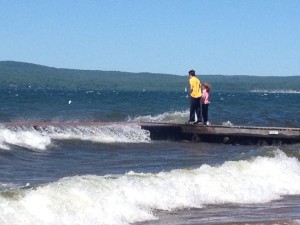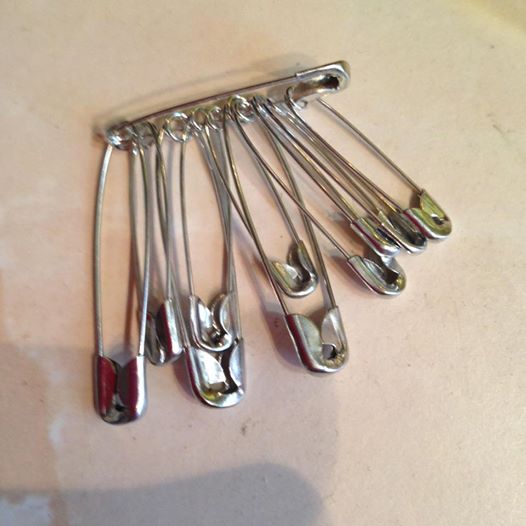Editors’ Note: This article is part of the Public Square 2014 Summer Series: Conversations on Religious Trends. Read other perspectives from the Pagan community here.
 “Has Pagan Environmentalism Failed?” the prompt asks us to consider.
“Has Pagan Environmentalism Failed?” the prompt asks us to consider.
I don’t even know what “Pagan” environmentalism is.
But the question is moot. The “isms” can be thrown away. The world is alive and aware and we are part of it. The world is not dying, but it is possible that we, along with so many other species, are.
Traditional environmentalism will tell you that agriculture in the Midwest in the 19-20th centuries destroyed the great prairie ecosystem. But there is another story, from another culture, that says the prairie is waiting, just under the surface, and will come back when our relation to the land changes.
What does that mean?
**
Each morning I go down to my office and share a cup of coffee with whatever gods and spirits the day will bring my way, whichever wights the night has left me. Now, you can laugh (and I’m quite sure some of my friends and family do, yes) at the thought of me slopping a couple of tablespoons of coffee into a mug each morning in my office. What’s it gonna get you? What is it for? Nothing happens. That is missing the point. Through our gift, we acknowledge we have already received, simply by being alive, being present, being part of the pattern. Through our gift, we weave ourselves a little more deeply into that pattern. We establish connection, relation.
So nothing is supposed to “happen” (except hopefully the coffee wakes me up).
Gift economies have been found the world over. The European settlers misinterpreted the Native Americans’ pattern of gift giving in early contact and hence the offensive and mistaken term “Indian giver” came into being. For that matter, we (for I am descended from those settlers and am planted firmly in this culture) also misheard and misunderstood “potlatch”—a feast where wealth is given away and honor accrued through the giving—turning it into “potluck,” at best a church supper and at worst “luck of the draw.”
We misunderstand the nature of religious offerings if we mistake what is a gift economy for a notion of simple reciprocity or a “prosperity gospel.” This gift economy emphasizes establishing and maintaining good relation. It’s also about passing the gift forward.
**
We brought our culture with us… and we were curiously un-curious about the cultures already here—plant, animal, human — for far too long.
We’re still curiously un-curious in how we approach our place in the world. The failure of environmentalism, Pagan-identified or not, as far as I can tell, is—it has not been radical enough. We have understood ourselves as humans as somehow separate and separated from the environment—it is our specifically human footprint upon a passive and receptive “nature” that traditional environmentalism addresses. If we can “lessen our impact” we can save the world.
I am not interested in saving this world—I don’t even know what that would mean, outside of me trying to protect my privileged lifestyle, which given the reality of most peoples across the globe I have no right to do. I do hope that humans will survive this wave of extinctions because I have a soft spot for our species. But I’m convinced in order to survive our relation to the land must change. We must listen harder, respond more thoughtfully and also more immediately.
The world is alive and aware and we are part of it. The world is not dying, but it is possible that we, along with so many other species, are. “In the midst of life we are in death. Earth to earth, ashes to ashes, dust to dust.” Given this reality, what does it mean to pay the gift forward now?
I say: in the midst of death we are in life—let’s not forget that. We can honor our beloved dead and mourn extinctions personal and monumental, but our allegiance in the gift economy is to the living and those to come. Listen, grow. Stay flexible. Recognize what symbiotic relationships you are part of, what permacultures you participate in. Play your role. Nurture those around you, be they human, plant, animal, mineral, other.
We must remember our places. We must remember ourselves within these places. What would it be to acknowledge and embrace our own immersion in the land, and our own vulnerability? As someone who is more an indoor than outdoor person, what I’m saying here challenges me. I’m not advocating for some nostalgic back-to-the-land movement. So what do I think must happen?
I don’t have any easy or quick answers tonight, but somewhat vaguely, I can say: the word “pagan” for me is not a question of believing one thing or another. And it’s not a set of practices or rituals. If it’s anything at all, “pagan” signifies an altered orientation to the world we inhabit. Who do you listen to and for? Are you willing to attune yourself to river bend? To the passerine? This summer’s rampant Queen Anne’s lace?
We are in life, meshed, snared, scared and dancing still, and have a responsibility to act like it.
















